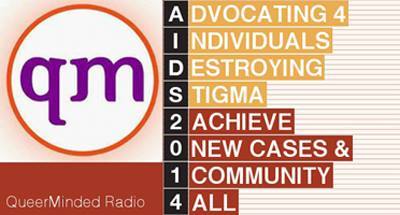
Recently, a colleague put me in touch with the host, Orie Givens IV, of Queer Minded, a weekly online radio show that addresses queer news, information and entertainment, to discuss possibly issues that may be encountered by LGBTQ people during the holidays. Here are potential scenarios that could apply to you as an LGBTQ person during the holidays:
Scenario One:
Let's take an 18-year old LGBTQ person who lives in the middle of country with his/her family. He/she has been contemplating whether coming out of the closet is a good idea, because it has been become apparent their sexuality is not an acceptable part of the heterosexual culture that pervades their home and community. Fears have been constantly part of the thinking process in terms of how the family will respond to this "coming out" -- will their consequences lead to being evicted from their home, or the continuation of hiding their identity, like a "don't ask, don't tell" situation?
My clinical intuition is to trust one's instincts on the outcome of the response. If you believe your family and community are going eject you, I recommend being quiet until you can remove yourself from this environment and find a safe haven. I think many people of this age category tend to wait until college to come out, since they are not living with their family and colleges are more welcoming of LGBTQ people. If not college, then wait until you find a place that is your home, or if needed, relocate. Many gay men are likely to move away from their home towns to places like New York City or San Francisco, or another gay-friendly city, not just for school or work, but for safety. Sadly, moving to another part of the country may be the solution as a way to identify a new family, like friends, who will accept you and be there for you during the holidays.
Another recommendation is if you know of a role model, mentor or peer who is also LGBTQ, you should talk with that person about their process of coming out, or utilize their social support to manage the ongoing heterosexism you might experience in your home and community. Many young people are using the Internet as well, like forums, listservs and Facebook to find others like them and their stories of coming out. I highly recommend this as a resource to turn to for guidance and navigation in this process -- but to be aware of others who have access to the information. Can someone log into your account? Are people connected to you that can out you? Can someone in your household review the websites that you frequented? I know this is an extremely uncomfortable way to live, but I say keep safe and be cautious as your MO. There are hotlines as well, like the Trevor Lifeline (866-488-7386). Maybe you can go to a local library and use their technology and locate people who can provide support; it's as simple as typing in the words "LGBTQ support" in Google.
Of course, another avenue to try is your school, where social workers and other school support staff reside, or to identify resources within your local community that clearly spell out their ability to engage with LGBTQ people. I say test the waters and see if the counselors can be of assistance with talking through this process. Now, I come from the angle of the more serious of consequences, but if your family seems open to differences, multiculturalism and diversity, you should trust that the "coming out" conversation is acceptable. Perhaps use subtle cues, like asking what your family thinks of people who identify proudly as LGBTQ in the popular culture. It deflects from what you're implicitly seeking from them in terms of their response. You have to gather information, before you have the difficult decision to have the talk with them.
And other important factor to consider is the intersectionality of other identity categories that could have an impact on the coming out process. As a black gay person, your family may fully realize you are gay, but expect you to keep that separate from the family, even during the holidays. You may be disabled and gay, and you think your family cannot tolerate another "coming out," but it's important to evaluate their responses and what is in your best interests. The hardest part is accepting your family may never accept all aspects of you, namely, not allowing your sexuality to be part of the holidays, yet their heterosexuality screams loudly. But you must know there are others in the LGBTQ community who will welcome you into their homes to celebrate the holidays, where do you not have to conform and pass, in order to condone the heterosexism and homophobia where you were raised.
Scenario Two:
The second scenario I deliberately chose resembles something like my own family and my experiences during the holidays. Clinically trained social workers who are steeped in the psychoanalytic tradition may not agree with this use of personal experience to frame and understand other's issues, but I have always found honing in on it helps to provide relatability to the client's experiences. I call upon my relationship, since there are LGBTQ people who are in healthy and happy relationships, and would like to enjoy this special time of year with their families and partners/spouses. I am soon-to-be 34 years old, have been with my partner for the last 10 years, and both of us are Italian-Americans from Brooklyn, New York. Both of our families are welcoming of our relationship, always inviting us over for the holidays, but we do not feel comfortable -- not only due to the dysfunctional communicative patterns present, but because we recognize the values, experiences and perceptions of our LGBTQ community are ignored. There is a preponderance of the over-heterosexualization of the holidays, where all traditions remain intact, with the inability to address our needs during the holidays.
It reminds me of a time that I attended a lecture given by an HIV scholar at NYU, a New Yorker of Greek descent, who said that he and his partner dreaded the thought of going to their family's houses since they are heterosexualized by their families. Meaning, they must re-conceptualize the notions of being gay for being straight to make their families happy. For example, what if you and your partner have an open relationship? It is likely that your family will not welcome or condone this openness to sexuality or sexual experience. What is served, discussed, attired, valued, adorned, are all vetted and patriarchically claimed by the famil -- not by you and your partner. You two are not part of the conversation for what will occur during the holidays.
From a clinical perspective, I advise clients in relationships, especially when they want to celebrate the holidays together, to not separate. Go to people who you relate to, accept and love you for being you. And if friends are unavailable, then find people in your local community who are welcoming to LGBTQ people to celebrate the holidays with. Some of this appears common sense, but it can evade us when we are wrapped up in thinking there is one option for the holidays -- only to see family. I also caution that drinking, partying and drugging is not the solution to filling the void for a holiday. Escaping the reality that you should see the family or not is not going to make you feel happy in the end, or resolve how to make it a merry one. I suggest finding others in the LGBTQ community, including a therapist, who will help you negotiate what works for you and the partner ideally. Each situation depends on a number of factors, and it takes time to sort through what works and does not work for you. It is important to reflect on the present and past, in order to evaluate what is the best solution for you and your partner. Remember, you are never alone!


